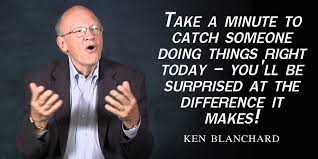Catch People Doing Something Right

Years ago, Ken Blanchard pointed out that “People who feel good about themselves produce good results, and people who produce good results feel good about themselves.” Unfortunately, too many work environments are focused on catching people making mistakes to point out where they need to improve performance. However, catching them doing something right and praising them will yield a quicker and more beneficial result.
Positive feedback is more than a way to improve performance. It is a powerful tool for employees to feel:
· more confident, which helps them to do a better job
· motivated, encouraging them to repeat the effective behavior frequently
· appreciated, leading to more motivation and engagement
· supported, leading to better working relationships and higher retention.
Helpful feedback is specific to the individual and the situation. There are some general guidelines in preparing feedback for your employee:
· whenever possible, link positive behavior to business results
· deliver the feedback as close in time to the event as possible
· provide positive feedback in front of others if you think they can benefit from it
· be specific and as detailed as possible to help the employee repeat the positive performance
· avoid giving positive feedback for trivial reasons
Provide feedback regularly so that your employees always know where they stand instead of waiting for a formal performance review.
It’s not just about saying “good job.” That can come across as vague and maybe even insincere. Instead, it is better to adopt a what/why approach – what did the person do that was impressive, and why was it effective. This technique helps the employee to understand how to continue performing well. Here are some specific examples:
An employee puts forth extra effort to serve a customer with a positive attitude.
“Thank you for putting in the extra effort during this busy time at work. I understand that working that hard isn’t always easy, but our customers and your team appreciate it. You are a valuable member of the team.”
An employee contributes to meetings by sharing new ideas and insights that are helpful to the team.
“Thank you for being prepared for our meetings. By coming to each meeting with well-researched and thought-out ideas, you’re helping us move forward in our process.”
An employee is submitting high-quality work on time and with attention to the details.
“Your work looks great! It is clear you care about your work and take the time to do it correctly. I especially liked your attention to detail in the analysis and am excited to see what you do next.”
An employee lacks confidence lately. Show him what he is good at.
“You have been doing a great job lately. You are so talented at staying flexible on any project, which helps everyone on the team. You have grown so much in your role since starting here. Thank you for your hard work and let me know if there is anything I can do to make working here better.
An employee finishes a difficult assignment that she hasn’t done before, maintaining a positive attitude and working hard.
“I am pleased with your determination to finish this project. I know it wasn’t easy, but I knew you could do it. Thank you for your extra effort.”
Catching people doing something right and telling them you noticed helps your team feel motivated and engaged in their work, as well as understanding your company’s standards. Provide employees with specific feedback rather than a generic thank you. Your employees want to know what is working and where they excel.


